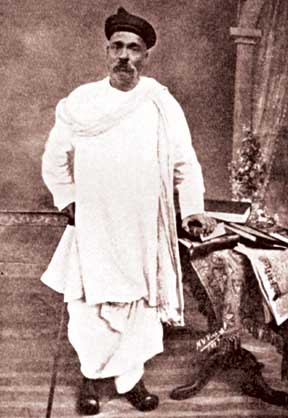[Hunt, Frazier, Great Personalities, http://books.google.com/books?id=EgEZRS4xer0C&pg=PT153, 1931, New York Life Insurance Company, 153–]
Bál Gangádhar Tilak: Citáty anglicky
“Swaraj is my birthright, and I shall have it!”
Said by Tilak as one of the first and strongest advocates of "Swaraj" (self-rule) and a strong radical in Indian consciousnessin "The Political Thought of Lokmanya Bal Gangadhar Tilak", By K. S. Bharathi, page 38
Varianta: Freedom is my birthright. I must have it.
Quotations by 60 Greatest Indians, Dhirubhai Ambani Institute of Information and Communication Technology http://resourcecentre.daiict.ac.in/eresources/iresources/quotations.html,
[Ashok Pant, The Truth of Babri Mosque, http://books.google.com/books?id=39tW7k_0MI4C&pg=PA15, August 2012, iUniverse, 978-1-4759-4289-7, 15–]
“If God is put up with untouchability, I will not call him God.”
[Hunt, Frazier, Great Personalities, http://books.google.com/books?id=EgEZRS4xer0C&pg=PT153, 1931, New York Life Insurance Company, 153–]
[Ashok Pant, The Truth of Babri Mosque, http://books.google.com/books?id=39tW7k_0MI4C&pg=PA15, August 2012, iUniverse, 978-1-4759-4289-7, 55]
“The compilation of hymns into Sanhitas also appears to be a work of the early part of this period.”
“The Arctic Home in the Vedas” on dating of the Vedas to 3000 to 1400 BC [Ganga Prasad, The Fountainhead of Religion: A Comparative Study of the Principle Religions of the World and a Manifestation of Their Common Origin from the Vedas, http://books.google.com/books?id=0QO_zed25R4C&pg=PA222, 1 January 2000, Book Tree, 978-1-58509-054-9, 222–]
“The Arctic Home in the Vedas” on dating of the Vedas to 3000 to 1400 BC [Ganga Prasad, The Fountainhead of Religion: A Comparative Study of the Principle Religions of the World and a Manifestation of Their Common Origin from the Vedas, http://books.google.com/books?id=0QO_zed25R4C&pg=PA222, 1 January 2000, Book Tree, 978-1-58509-054-9, 222–]
Tilak, quoted in Law in the Scientific Era by M. Hidayatullah
His Criticism and opposition to the Agriculturist Relief Act 1879 and the reformist movement launched by others. Bal Gangadhar Tilak: Popular Readings, Page=15.
“You can never give the Musalmans too much.”
Tilak's reply when some Hindus complained that they were giving too much to the Musalmans. Related by Muhammad Ali about the Lucknow talks: Md. Ali: speech at annual session of Congress at Coconada in 1923 quoted in V.P. Varma: Modern Indian Political Thought, and quoted from Elst, Koenraad (2001). Decolonizing the Hindu mind: Ideological development of Hindu revivalism. New Delhi: Rupa. p. 126
His opposition to teaching women in English.[Pati, Biswamoy, Bal Gangadhar Tilak: Popular Readings, http://books.google.com/books?id=U4TWzCkjrm4C, 2011, Primus Books, 978-93-80607-18-4, 16]
[Bhagwat, A.K., Pradhan, G.P., Lokmanya Tilak – A Biography, http://books.google.com/books?id=bYfMbCXyc3kC&pg=PT167, 1958, Jaico Publishing House, 978-81-7992-846-2, 167–]
“…its ultimate origin is still lost in geological antiquity.”
“The Arctic Home in the Vedas” on dating of the Vedas to 3000 to 1400 BC [Ganga Prasad, The Fountainhead of Religion: A Comparative Study of the Principle Religions of the World and a Manifestation of Their Common Origin from the Vedas, http://books.google.com/books?id=0QO_zed25R4C&pg=PA222, 1 January 2000, Book Tree, 978-1-58509-054-9, 222–]
Tilak, reproduced in V.D. Savarkar: Hindutva, and quoted in Elst, Koenraad (2002). Who is a Hindu?: Hindu revivalist views of Animism, Buddhism, Sikhism, and other offshoots of Hinduism. ISBN 978-8185990743
About Tilaks influential book on the Rigveda. Elst, Koenraad. Return of the Swastika: Hate and Hysteria versus Hindu Sanity (2007)
Sri Aurobindo, (From an introduction to a book entitled Speeches and Writings of Tilak.), quoted from Sri Aurobindo, ., Nahar, S., Aurobindo, ., & Institut de recherches évolutives (Paris). India's rebirth: A selection from Sri Aurobindo's writing, talks and speeches. Paris: Institut de Recherches Evolutives. 3rd Edition (2000). https://web.archive.org/web/20170826004028/http://bharatvani.org/books/ir/IR_frontpage.htm
Sri Aurobindo, 1918, quoted from Sri Aurobindo, ., Nahar, S., Aurobindo, ., & Institut de recherches évolutives (Paris). India's rebirth: A selection from Sri Aurobindo's writing, talks and speeches. Paris: Institut de Recherches Evolutives. 3rd Edition (2000). [3]
Sri Aurobindo, (From an introduction to a book entitled Speeches and Writings of Tilak.), quoted from Sri Aurobindo, ., Nahar, S., Aurobindo, ., & Institut de recherches évolutives (Paris). India's rebirth: A selection from Sri Aurobindo's writing, talks and speeches. Paris: Institut de Recherches Evolutives. 3rd Edition (2000). https://web.archive.org/web/20170826004028/http://bharatvani.org/books/ir/IR_frontpage.htm
Mahatma Gandhi, Selected Letters: Gandhi -Tilak Correspondence, 29 November 2013, MK Gandhi organization http://www.mkgandhi.org/Selected%20Letters/gandhi-tilakcorr.htm,
“In India there was only one natural aggressive nationalist and he was Tilak.”
Stated by Montague, Secretary of State for India.[Hunt, Frazier, Great Personalities, http://books.google.com/books?id=EgEZRS4xer0C&pg=PT153, 1931, New York Life Insurance Company, 153–]
